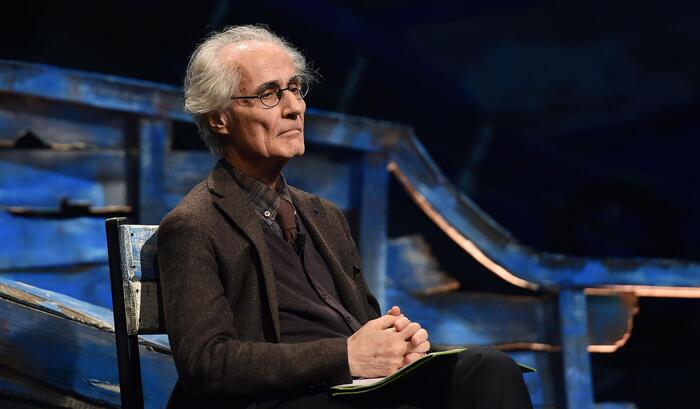Chanel, Fiorucci, Valentino, Esprit, Jesus, Prenatal.
Benetton, of course.
Also Toyota and Artemide.
Even the Italian Ministries of Labor and Social Security.
It is to account for the number of advertising campaigns plotted and photographed as socio-cultural bombs by Oliviero Toscani (Milan, 80 years old) and understand to what extent this way of communicating brand has to be his thing for at least three decades.
Son of Fedele Toscani, who was the first photojournalist for Corriere della Sera;
Trained in photography and design at the Zurich University of Art, he has spent half a century with his camera at the ready, observing and portraying human nature to the (continued) tantrum of those who are unable to think for themselves or have preferred to stop do it, he says.
A political activist in his own way, in 1991 he founded Colors,
that “magazine about the rest of the world” with which he expanded the then unusual multicultural ideology that he practiced as artistic director of the Benetton group between 1982 and 2000. His creative radius of action reaches books, television, university educational programs and multiple exhibitions, such as the which can be seen this weekend at the Kappa FuturFestival in Turin.
There, in an atmosphere of rave techno, he shows the latest portraits —a series made during the 2019 edition of the festival to which the images that accompany this interview belong— of his project Human Race, boasting of the anthropological photographic study he began in 2007 "After all this time, photographing people has helped me understand the world," he concedes via Zoom from his studio in Tuscany.
To honor linguistic diversity, he asks him,
He photographed the Human Race series that he is now exhibiting in 2019. They say that after these two years of the pandemic we have changed, that the world is different.
Is it possible that yours is the portrait of a society that no longer exists?
The human being in himself is a testimony of his time.
There is no one like you, you are unique, with your circumstances, your experiences, your culture.
These are the faces of today's youth.
The new youngsters.
I am very curious to see what is going to happen, what are you going to do as a society from this moment on.
That has always been my job: to bear witness to my time.
Oliviero Toscani began to portray diversity two decades ago, although he did not finalize his project until 2007 with Human Race, a study on physical differences/peculiarities.
The portrayed on these pages are part of the latest series of portraits of him, made at the Kappa FuturFestival in Turin in 2019. Oliviero Toscani
Oliviero Toscani began to portray diversity two decades ago, although he did not finalize his project until 2007 with Human Race, a study on physical differences/peculiarities.
The portrayed on these pages are part of the latest series of portraits of him, made at the Kappa FuturFestival in Turin in 2019. Oliviero Toscani
Oliviero Toscani began to portray diversity two decades ago, although he did not finalize his project until 2007 with Human Race, a study on physical differences/peculiarities.
The portrayed on these pages are part of the latest series of portraits of him, made at the Kappa FuturFestival in Turin in 2019. Oliviero Toscani
Oliviero Toscani began to portray diversity two decades ago, although he did not finalize his project until 2007 with Human Race, a study on physical differences/peculiarities.
The portrayed on these pages are part of the latest series of portraits of him, made at the Kappa FuturFestival in Turin in 2019. Oliviero Toscani
Oliviero Toscani began to portray diversity two decades ago, although he did not finalize his project until 2007 with Human Race, a study on physical differences/peculiarities.
The portrayed on these pages are part of the latest series of portraits of him, made at the Kappa FuturFestival in Turin in 2019. Oliviero Toscani
Oliviero Toscani began to portray diversity two decades ago, although he did not finalize his project until 2007 with Human Race, a study on physical differences/peculiarities.
The portrayed on these pages are part of the latest series of portraits of him, made at the Kappa FuturFestival in Turin in 2019. Oliviero Toscani
Oliviero Toscani began to portray diversity two decades ago, although he did not finalize his project until 2007 with Human Race, a study on physical differences/peculiarities.
The portrayed on these pages are part of the latest series of portraits of him, made at the Kappa FuturFestival in Turin in 2019. Oliviero Toscani
Oliviero Toscani began to portray diversity two decades ago, although he did not finalize his project until 2007 with Human Race, a study on physical differences/peculiarities.
The portrayed on these pages are part of the latest series of portraits of him, made at the Kappa FuturFestival in Turin in 2019. Oliviero Toscani
Oliviero Toscani began to portray diversity two decades ago, although he did not finalize his project until 2007 with Human Race, a study on physical differences/peculiarities.
The portrayed on these pages are part of the latest series of portraits of him, made at the Kappa FuturFestival in Turin in 2019. Oliviero Toscani
Oliviero Toscani began to portray diversity two decades ago, although he did not finalize his project until 2007 with Human Race, a study on physical differences/peculiarities.
The portrayed on these pages are part of the latest series of portraits of him, made at the Kappa FuturFestival in Turin in 2019. Oliviero Toscani
Oliviero Toscani began to portray diversity two decades ago, although he did not finalize his project until 2007 with Human Race, a study on physical differences/peculiarities.
The portrayed on these pages are part of the latest series of portraits of him, made at the Kappa FuturFestival in Turin in 2019. Oliviero Toscani
Oliviero Toscani began to portray diversity two decades ago, although he did not finalize his project until 2007 with Human Race, a study on physical differences/peculiarities.
The portrayed on these pages are part of the latest series of portraits of him, made at the Kappa FuturFestival in Turin in 2019. Oliviero Toscani
Oliviero Toscani began to portray diversity two decades ago, although he did not finalize his project until 2007 with Human Race, a study on physical differences/peculiarities.
The portrayed on these pages are part of the latest series of portraits of him, made at the Kappa FuturFestival in Turin in 2019. Oliviero Toscani
Oliviero Toscani began to portray diversity two decades ago, although he did not finalize his project until 2007 with Human Race, a study on physical differences/peculiarities.
The portrayed on these pages are part of the latest series of portraits of him, made at the Kappa FuturFestival in Turin in 2019. Oliviero Toscani
Oliviero Toscani began to portray diversity two decades ago, although he did not finalize his project until 2007 with Human Race, a study on physical differences/peculiarities.
The portrayed on these pages are part of the latest series of portraits of him, made at the Kappa FuturFestival in Turin in 2019. Oliviero Toscani
Oliviero Toscani began to portray diversity two decades ago, although he did not finalize his project until 2007 with Human Race, a study on physical differences/peculiarities.
The portrayed on these pages are part of the latest series of portraits of him, made at the Kappa FuturFestival in Turin in 2019. Oliviero Toscani
Oliviero Toscani began to portray diversity two decades ago, although he did not finalize his project until 2007 with Human Race, a study on physical differences/peculiarities.
The portrayed on these pages are part of the latest series of portraits of him, made at the Kappa FuturFestival in Turin in 2019. Oliviero Toscani
Oliviero Toscani began to portray diversity two decades ago, although he did not finalize his project until 2007 with Human Race, a study on physical differences/peculiarities.
The portrayed on these pages are part of the latest series of portraits of him, made at the Kappa FuturFestival in Turin in 2019. Oliviero Toscani
Oliviero Toscani began to portray diversity two decades ago, although he did not finalize his project until 2007 with Human Race, a study on physical differences/peculiarities.
The portrayed on these pages are part of the latest series of portraits of him, made at the Kappa FuturFestival in Turin in 2019. Oliviero Toscani
Oliviero Toscani began to portray diversity two decades ago, although he did not finalize his project until 2007 with Human Race, a study on physical differences/peculiarities.
The portrayed on these pages are part of the latest series of portraits of him, made at the Kappa FuturFestival in Turin in 2019. Oliviero Toscani
Oliviero Toscani began to portray diversity two decades ago, although he did not finalize his project until 2007 with Human Race, a study on physical differences/peculiarities.
The portrayed on these pages are part of the latest series of portraits of him, made at the Kappa FuturFestival in Turin in 2019. Oliviero Toscani
Oliviero Toscani began to portray diversity two decades ago, although he did not finalize his project until 2007 with Human Race, a study on physical differences/peculiarities.
The portrayed on these pages are part of the latest series of portraits of him, made at the Kappa FuturFestival in Turin in 2019. Oliviero Toscani
Oliviero Toscani began to portray diversity two decades ago, although he did not finalize his project until 2007 with Human Race, a study on physical differences/peculiarities.
The portrayed on these pages are part of the latest series of portraits of him, made at the Kappa FuturFestival in Turin in 2019. Oliviero Toscani
Oliviero Toscani began to portray diversity two decades ago, although he did not finalize his project until 2007 with Human Race, a study on physical differences/peculiarities.
The portrayed on these pages are part of the latest series of portraits of him, made at the Kappa FuturFestival in Turin in 2019. Oliviero Toscani
Oliviero Toscani began to portray diversity two decades ago, although he did not finalize his project until 2007 with Human Race, a study on physical differences/peculiarities.
The portrayed on these pages are part of the latest series of portraits of him, made at the Kappa FuturFestival in Turin in 2019. Oliviero Toscani
Oliviero Toscani began to portray diversity two decades ago, although he did not finalize his project until 2007 with Human Race, a study on physical differences/peculiarities.
The portrayed on these pages are part of the latest series of portraits of him, made at the Kappa FuturFestival in Turin in 2019. Oliviero Toscani
Oliviero Toscani began to portray diversity two decades ago, although he did not finalize his project until 2007 with Human Race, a study on physical differences/peculiarities.
The portrayed on these pages are part of the latest series of portraits of him, made at the Kappa FuturFestival in Turin in 2019. Oliviero Toscani
Oliviero Toscani began to portray diversity two decades ago, although he did not finalize his project until 2007 with Human Race, a study on physical differences/peculiarities.
The portrayed on these pages are part of the latest series of portraits of him, made at the Kappa FuturFestival in Turin in 2019. Oliviero Toscani
Why did you want to portray the attendees of an event as specific as the Kappa FuturFestival, one of the great European events of electronic dance music?
What did you expect to find?
A certain humanity.
A very special selection of people is concentrated there, especially young people who have their own codes.
They are different collectivities, different tribes.
And only the tribe prevails because of the feeling of belonging it generates.
He talks about codes and tribal membership, the foundations of any youth subculture.
Are countercultural expressions still possible in times of single thought?
The counterculture will always exist, whether it manifests itself in a more or less obvious way.
Although only the minority has the capacity to subvert.
And I say subvert, not revolutionize, which are very different things.
I have photographed Muhammad Ali, the Rolling Stones, Bob Dylan;
I have seen the moment of subversion in the first person since the early sixties, people who meet at a certain moment and are activated depending on the circumstances, the situation that society favors.
Describes human race as a sociopolitical, cultural and anthropological study through the morphology of people.
Is it that you are more interested in the exterior than the interior?
Morphology and psychology go hand in hand.
The image we project is a political expression, and all aesthetics have a very important political and sociocultural meaning.
With my camera, I risk interpreting the psychology of people by their mere appearance.
The way of dressing, moving the hands, being, being… Aesthetics is pure communication.
Just like art.
How do you approach the subjects of your photographs, how do you choose them?
I always look directly into the eyes of those I photograph.
Well, actually I try to make them look at mine, as if they were photographing me.
Contrary to the fashion photographer, who seduces his models, I want to be the one seduced through the curiosity, the desire to search and the dreams that their gazes reveal to me.
All the portraits of Human Race start from that principle.
Is he also able to see, to grasp the soul?
I don't know if I would call it a soul.
I prefer life energy.
And it has its own sound.
It is that voice that tells you how to do things.
I listen to it constantly.
And you have to have the courage to follow her, especially when she goes against what is politically correct, or she will stop talking to you.
Photography by Oliviero Toscani for the 1996 Benetton campaign. Oliviero Toscani
Is that why you have used such a tricky term right now as race to title this project?
Because it brings controversy, logical!
It was a conscious, intentional decision.
Humanity is one, infinite, but we are the ones who speak of races and we take advantage of it to promote division and exclusion.
You were a pioneer in showing that society is naturally diverse with your work.
Today this is a recurring idea, trivialized in marketing discourse...
We live in a state of fear of being different.
We are only capable of accepting difference if others are just as different from us.
Those who have the courage to raise their voices and say “I am different” are the rare ones, but they will change the world, not those who share their lives on Facebook.
Social networks are a modern concentration camp, where people enter of their own free will to be brainwashed.
This whole thing about Instagram, the influencers, is totally fascism.
And fascism is very comfortable because it does not require you to reason.
Your intellect, your heart, your creativity, you leave them in the hands of others.
Is the rise of fascism a consequence of that creative and intellectual comfort in which we have settled as a society?
And the lack of a vision of the future.
We are scared, humanity is afraid because it has lost its enthusiasm.
Without enthusiasm there is no future perspective and when that vision of the future is lacking, fear arises.
And with fear, fascism becomes strong.
If you don't imagine tomorrow, there is no hope.
How much time do we spend a day imagining?
Right now, very little.
We have mobile phones, computers that make us lose sight of the intangible.
When Picasso painted Guernica he made us see the intangible.
That is a human quality that we are forgetting.
We have a creative brain that is our best quality and, at the same time, our downfall.
Has technology made us fools?
Technology does a good service, it is a tool.
A knife I can use in the kitchen, to carve a sculpture and also to kill you.
Technology is just a means, even though we think it solves our problems.
No way.
A computer is a fast jerk, fast, but totally idiotic.
And this situation is creating a lot of jerks.
I am fascinated by today's teenagers, they are much more interesting to me than adults of 30 or 40 years old, but in a certain sense —and I don't want to generalize— I also find them a bit of a swindler because of their tendency to abdicate their intellect in favor of technology.
Has globalization killed individuality?
It is not globalization, it is monoculture.
The uniform culture that is the same for everyone, everywhere, and that kills local cultural expressions.
Does the world today, and Europe in particular, have an identity problem?
The exhibition I just did at Berlin's Potsdamer Platz, The Germans of the 21st Century [ended June 15] can answer that question.
It is a portrait of how a country has changed through the faces of its inhabitants.
These new Germans have transformed the landscape of their towns and cities because most of them are immigrants.
The same could be said of France, Italy or Spain.
Identity, what is it?
National proud?
Photography by Oliviero Toscani for the 1991 Benetton campaign. Oliviero Toscani
You, who have been the engine of change in advertising and fashion photography, do you feel that the story, the message, has gone backwards?
The artist depends on the intelligence of his client, someone who gives him the opportunity to subvert.
And I've always tried to work for smart people.
I was lucky because at that time marketing had not yet contaminated the business.
Today the first thing is the sale;
Before, experimentation, research and improvisation prevailed.
Insecurity, even.
Now they tell you what to think, what to do.
If you want to change things, do the opposite.
When everyone is going in one direction, you must run in the opposite direction.
You will be alone, but soon you will become visible and stand out.
From where you stand, it's easy to say that, but think about job instability and young people who need to keep increasingly precarious jobs...
For this reason there is no work.
If you go to the contrary, you create a new dimension, you create the future.
You have to be a jerk.
This is the expression of my intelligence, of my ability, and with it I give you the opportunity to reflect, to open debate, to understand that thought can be diverse.
I don't go to the movies or read a book to relax, I want to be surprised, feel provoked.
The word provocation has a negative meaning, why?
Because the monoculture does not like to be challenged.
Nobody wants to see their security disturbed: I'm a male, I'm a woman, what the hell.
We must constantly question our own truth.
Good judgment kills creativity [laughs].
This year marks the 30th anniversary of that Benetton campaign, that of the spring-summer of 1992, in which it used as a claim the photograph of the terminally ill AIDS patient that earned Therese Frare a World Press Photo.
How do you remember?
Advertising photography gives you the opportunity to appear in all the world's media at once.
The interesting thing about the moment was committing that prank, because sex was related to death like never before.
Luciano [Benetton, co-founder of the firm and senator for the Italian Republican Party in the 1990s], who is a smart businessman, understood instantly.
Furthermore, AIDS was wreaking havoc on fashion, while the industry looked the other way.
There was a lot of hypocrisy.
That caused a stir, but because of a certain moral and cultural education.
They insulted me and attacked me in the street.
They said that we took advantage of the suffering of others to sell clothes.
Was Caravaggio painting Madonnas to sell the Catholic Church?
No, he was looking for a human aesthetic that transcended religion.
That is art.
What do you think would happen today if you repeated the play with a covid patient?
It would not be the same for a simple reason: HIV meant a social stigma, associated with homosexuality.
The problem was not so much the disease as the moral, religious implication that covid does not have.
Perhaps the current reading of such an image would have to do with the difference in class.
Possibly, but you have to think that, in aesthetic terms, wealth is always vulgar.
I find luxury obscene and even more so how it is represented in the media.
Look at those magazines that turn fashion into something ugly, antisocial, racist, discriminatory, fascist.
I have worked for them.
Outside of their schemes, diversity is dangerous, also because it does not pay off economically.
And today we have a horrible panic about the economy, as I would never say.
Do you plan to give continuity to your proverbial laboratories of ideas, Fabrica and La Sterpaia, or are you already tired of looking for solutions for others?
I am planning a new platform: Oliviero Toscani Circus.
I want to organize meetings and debates that encourage dialogue and diversity of ideas.
The first one is going to be called Egowash [laughs], to then deal with issues such as labor responsibility.
At the end of August I am also planning a future analysis workshop with Marina Abramovic under the title Where Do We Go from Now?
[Where are we going from now?], which we will present during the Venice Film Festival.
And besides, I have been given a fascinating assignment: Father Enzo Fortunato, communication director of the Sacred Convent of Assisi and one of the Pope's advisers, has asked me to orchestrate something that can attract people to the Basilica of San Francisco beyond Giotto's frescoes.
I mean,
Is there anything more megalomaniacal than trying to outdo Giotto?
Of course why not?
I already know what I am going to do: a world exhibition on all the problems that humanity does not want to see.
50% off
Exclusive content for subscribers
read without limits
subscribe
I'm already a subscriber







/cloudfront-eu-central-1.images.arcpublishing.com/prisa/XMI5DEX3DJDINGEKDTN43BWB5E.jpg)

